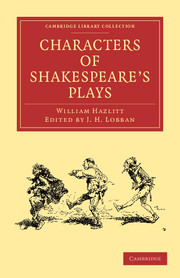Book contents
- Frontmatter
- Preface
- Contents
- Introduction
- Preface
- Cymbeline
- Macbeth
- Julius Cæsar
- Othello
- Timon of Athens
- Coriolanus
- Troilus and Cressida
- Antony and Cleopatra
- Hamlet
- The Tempest
- The Midsummer Night's Dream
- Romeo and Juliet
- Lear
- Richard II
- Henry IV
- Henry V
- Henry VI
- Richard III
- Henry VIII
- King John
- Twelfth Night; or, what you will
- The Two Gentlemen of Verona
- The Merchant of Venice
- The Winter's Tale
- All's Well That Ends Well
- Love's Labour's Lost
- Much Ado About Nothing
- As You Like It
- The Taming of the Shrew
- Measure for Measure
- The Merry Wives of Windsor
- The Comedy of Errors
- Doubtful plays of Shakespear
- Poems and Sonnets
- Notes
Henry IV
Published online by Cambridge University Press: 07 September 2010
- Frontmatter
- Preface
- Contents
- Introduction
- Preface
- Cymbeline
- Macbeth
- Julius Cæsar
- Othello
- Timon of Athens
- Coriolanus
- Troilus and Cressida
- Antony and Cleopatra
- Hamlet
- The Tempest
- The Midsummer Night's Dream
- Romeo and Juliet
- Lear
- Richard II
- Henry IV
- Henry V
- Henry VI
- Richard III
- Henry VIII
- King John
- Twelfth Night; or, what you will
- The Two Gentlemen of Verona
- The Merchant of Venice
- The Winter's Tale
- All's Well That Ends Well
- Love's Labour's Lost
- Much Ado About Nothing
- As You Like It
- The Taming of the Shrew
- Measure for Measure
- The Merry Wives of Windsor
- The Comedy of Errors
- Doubtful plays of Shakespear
- Poems and Sonnets
- Notes
Summary
IN TWO PARTS
If Shakespear's fondness for the ludicrous sometimes led to faults in his tragedies (which was not often the case) he has made us amends by the character of Falstaff. This is perhaps the most substantial comic character that ever was invented. Sir John carries a most portly presence in the mind's eye; and in him, not to speak it profanely, “we behold the fulness of the spirit of wit and humour bodily.” We are as well acquainted with his person as his mind, and his jokes come upon us with double force and relish from the quantity of flesh through which they make their way, as he shakes his fat sides with laughter, or “lards the lean earth as he walks along.” Other comic characters seem, if we approach and handle them, to resolve themselves into air, “into thin air;” but this is embodied and palpable to the grossest apprehension: it lies “three fingers deep upon the ribs,” it plays about the lungs and the diaphragm with all the force of animal enjoyment. His body is like a good estate to his mind, from which he receives rents and revenues of profit and pleasure in kind, according to its extent, and the richness of the soil. Wit is often a meagre substitute for pleasurable sensation; an effusion of spleen and petty spite at the comforts of others, from feeling none in itself.
- Type
- Chapter
- Information
- Characters of Shakespeare's Plays , pp. 144 - 153Publisher: Cambridge University PressPrint publication year: 2009First published in: 1908

